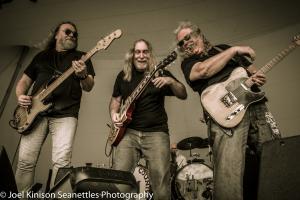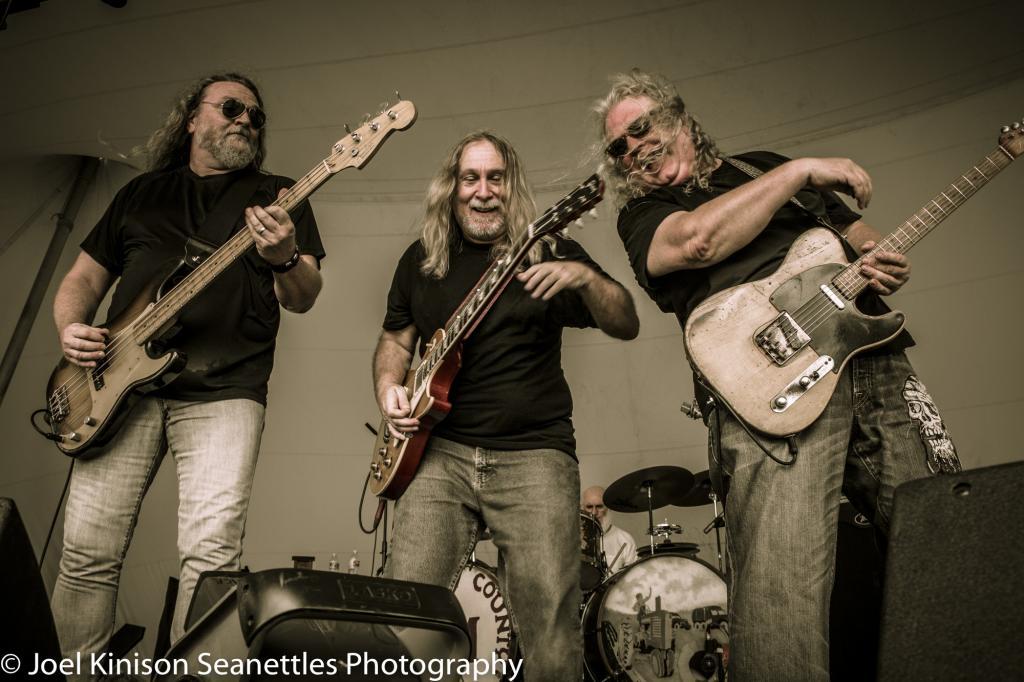
Richard Young describes the moment he and the rest of the Kentucky Headhunters met blues keyboardist Johnnie Johnson. “I think for a minute we almost scared him to death. He kind looked up like, ‘Who are these cracker hillbillies,’ you know what I mean? You could see the look on his face, and so when we got to talking, we talked all night long about music and about his relationship with Chuck (Berry), Keith Richards, and NRBQ guys. Johnny was heard to say later, ‘I was really uncomfortable at that party until the Headhunters showed up,’ and that was the start of a relationship that lasted until Johnny passed.”
On paper, they couldn’t be further apart. The Kentucky Headhunters come off as bearded Duck Dynasty hillbillies who mix heavy metal with country and blues while the late Johnnie Johnson was the distinguished black keyboard player who started his career playing in Chicago bars in the early 1950s and co-wrote some of Chuck Berry’s greatest hits without ever getting credit for it.
The brothers Richard and Fred Young started The Headhunters as Itchy Brother in 1968. It took them almost 20 years to get a record contract. “We made just about every mistake in the past 46 years you can make,” says Richard today. That said, their 1989 their debut album on Mercury, Pickin’ On Nashville, won a Grammy. They’ve taken three Country Music Awards, an American Music Award, Academy of Country Music Award and had four top 40 country hits. Billboard magazine has called them “the great American rock and roll band.”
“When Johnny Johnson sat down behind the piano, he became the band leader because he had this thing,” says Young. “As mild of a demeanor and gentlemanly as he was and quiet, when he sat down at the piano, he controlled the way to play. Till we’re 100 years old, we will never feel what we felt when we played with Johnny Johnson.”
Alligator Records in April released Meet Me in Blues Land, a red hot studio session that evolved from that first meeting between Johnson and the Headhunters at a pre-Grammy party in 1992. Front loaded with testosterone, it’s Chicago blues cruising with southern road house grease that would make the Georgia Satellites and Jerry Lee Lewis proud.
The album is just so right, like butter on an English muffin. Johnson told me in 2001, “I didn’t think rock and roll would be as big as it was. I grew up with this kind of music, country and hillbilly music. So, actually, it wasn’t nothing new to me. I just wasn’t playing it. I was playing standard tunes that was being played at the time I was coming up.”
Johnson had no idea that the sound he was creating with Chuck Berry would grow so big. “It’s becoming an international type of music now because it’s played everywhere, and now that blues is creeping back in, it’s going to give the rock kids kind of competition because blues is coming back in strong. Plus, the younger generation now is going to the blues more so than the rock. The blues I do understand, and it’s coming in strong.”
After Johnnie died in 2005, the 1993 sessions with the Headhunters got put on the back shelf until his widow called Richard Young. “Francis Johnson called me and said, ‘Richard, isn’t it about time we put out that music y’all and Johnnie recorded because fore long I gonna be too old and die, and I want to hear it.’”
I read to Richard what Johnnie said to me when I asked him if it angered him that Chuck Berry took total credit for “Maybelline” in 1955, just one of Chuck’s hits that Johnson co-wrote. Johnson said no. “It was my first experience going to a studio and recording and then behind that we had these 101 one-nighters coming up with the Alan Freed tour. So, it was all excitement. I didn’t have time to think about who was getting credit and who wasn’t getting credit. At the time only (the headliner) was the first name out front. Sidemen was never mentioned. So, it never bothered me at all. It was just water under the bridge to me. So, as far as getting named or not, no.”
“So sad,” says Young hearing Johnnie’s words. “And Johnny was a tip of the ice berg for a lot of ’em. Unfortunately for Johnny, what made the difference is that when Johnnie hired Chuck Berry in 1952 for his Sir John’s Trio, that was the culmination of the first rock and roll writing team in history in my opinion. I think we had a lot of great guys that wrote songs back then. You had the Everly Brothers a little later, Bill Haley and the Comets, Buddy Holly. All those guys were great entertainers and writers, but it was actually Johnnie’s thinking of bringing Chuck in for that one night.
“Later we knew (writing teams like) Mick Jagger and Keith Richards, Robert Plant and Jimmy Page or even Elton John and Bernie Taupin. And to think Johnny was really the guy. I mean Chuck didn’t have that in mind. Neither of them did. It was just a spark and a happening.”
After recording what would become Meet Me in Blues Land, The Kentucky Headhunters did some dates with Johnson. Johnnie’s wife Francis said to Richard Young, “Y’all just take him out there and let him play with y’all as the Headhunters. I don’t want him on the road with the Stones and Bobby Weir and all them guys. They’re all out there getting wild. Johnny’s got children. He don’t need that.”
“We did a west coast swing and a New England swing,” says Young. ‘The last day we played New York’s Lone Star. To a kid like me it was a dream come true, and it scared the shit out of me because when the lights came on every rock star that ever lived within 100 miles of New York was in that room. And I looked up in the balcony and damn if there’s not Levon (Helm) and (Rick) Danko (of The Band) up there doing a waltz together while we’re doing a song.
“And it just don’t get no better. People that I’d not ever met in my life was out there and shook our hands. ‘Great job, boys.’ I’m there with my mouth hanging open, you know. Here’s all these influential people that are a big part of rock and roll, and of course they didn’t come to see the Headhunters. Let’s face it, Don. They were there to see Johnny Johnson, and we were fortunate enough to be his band that night and many, many nights.
“Johnny comes back stage, and the Lone Star didn’t really have what you’d call a back stage. It was a hallway with an offset green room. Johnny put on an amazing show. He comes back to me and he goes, ‘Hey, Richard, little Rick Jaggers, you know the one that sings with Keith?’ I said, ‘You mean Mick Jagger?’ And he says, ‘Yeah, whatever.’ So I go run out front and he was gone.
“Evidently they were rehearsing for some album, maybe Voodoo Lounge or something, down the street, and I guess they disguised themselves and snuck in for a while, probably Keith and some of ’em. I don’t know who all, but anyway, he handed me this note. I’ll be damned. I lost the note before we got home, but I had this piece of paper and it says, ‘Hey, Johnny. You guys sounded fantastic or something like that, Mick.’ Johnny comes back and says, ‘That there is Rick Jaggers.’ That was pretty much the way Johnny was with everybody.”
The bond between The Headhunters and Johnson was deep. Segregation in Kentucky wasn’t strong enough to break the connection between a young Fred Young and the black families that farmed along side his. “Sunday afternoon. I’d never heard anything like that, and I was six or seven years old, and they’d be playing Little Walter. That was an experience for a six-year-old white kid. You couldn’t run from it. It rubbed off on us.
“These black folks were out there singing Negro spirituals and things I never heard. I was a six-year-old white kid who went to some staunch, corny, ignorant Baptist Church. All of a sudden, I wanted to go to church with them. And I did a lot because Aunt (Jennie) would take me, and I got to learn so much, man, and I was intrigued by it.
“Go down to the house, and mommy and daddy’s taste was somewhat eclectic but different. Daddy would be watching some movie like Oklahoma with movie standards, and you’d go in the kitchen, and mom would be ironing and she’d have Big John on WLCA. So we couldn’t escape it. Everywhere we went in our life thank goodness, we had this imprint of some sort of music.
The Kentucky Headhunters play the King Biscuit Blues Festival Thursday, October 8th. They will be joined by Kevin McKendree playing Johnnie Johnson’s part on keyboards. McKendree has been Delbert McClinton’s bandleader and worked with George Thorogood, Brian Setzer, and Tinsley Ellis.
Richard’s been drinking beer since he was14. He’s been married to the same wife for 35 years. “My wife today still bitches about stuff. One day, somebody interviewed her and said, ‘What’s it like being married to a Headhunter?’ They thought she was gonna say, ‘Most glorious thing in the world.’ She said, ‘Well, it’s pretty boring ’cause we don’t travel together. They say it takes the rock out of the roll, and we don’t wanna go anyway. It’s boring and, to be honest with you, we married Spanky and Our Gang.’”
Richard Young, 10 years after Johnnie Johnson’s death, still has difficulty acknowledging his worthiness in having been associated with the man who helped mold the career of Chuck Berry.
“Francis asked me to handle Johnny’s music catalog and business a year or so ago about the time we were getting ready to release this record, and I thought, you know, never in my life would I have dreamed that somebody would have respected me enough as a business person to help them, but at the same time I kinda think, what have I gotten myself into but, hey, you ain’t gonna get one over on Francis. You gotta get up way before daylight gets upon Francis Johnson, and she’s the same way as I am.”


